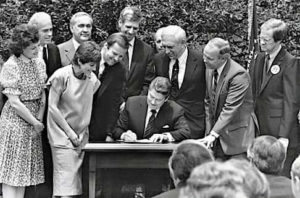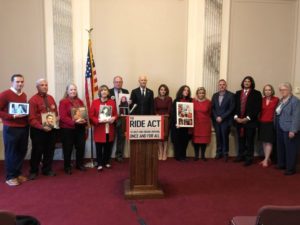Forty years ago, a grieving mother set into motion a movement.

On May 3, 1980, a drunk driver out of jail just two days following his fourth drunk driving arrest struck and killed 13-year-old Cari Lightner as she walked to a church carnival with a friend. The impact knocked Cari out of her shoes. The driver kept going.
That same year, Cari’s mother, Candace Lightner, harnessed her pain into an organization that has saved tens of thousands of lives.
When Mothers Against Drunk Driving (MADD) was founded at a kitchen table in 1980, 25,000 people died in these preventable crashes every year. Today, drunk driving kills about 10,000 people a year. We won’t stop or celebrate until that number reaches zero.
But as MADD marks its 40th anniversary in 2020, we are taking stock of how far we have come.

Three years after MADD’s founding, President Ronald Reagan signed into law the 21 minimum drinking age. By 1988, all 50 states had adopted it, saving nearly 32,000 lives, according to the National Highway Traffic Safety Administration.
In 2004, all 50 states adopted the .08 BAC threshold for driving. In 2006, MADD launched its Campaign to Eliminate Drunk Driving to end these violent crimes once and for all. That year, just one state required ignition interlocks for all drunk driving offenders – a cornerstone of the Campaign. Today, 34 states require these in-car breathalyzers for all drunk drivers. Ignition interlocks have stopped more than 3 million attempts to drive drunk in the last dozen years.

MADD has helped saved nearly 400,000 lives and served nearly 1 million victims in the last 40 years. We haven’t just changed laws. We’ve helped change America’s culture around drinking and driving.
MADD first used the term “designated driver” in 1986. Today, everyone knows that it is no longer acceptable to drink and drive and designated driver is part of our national vernacular. We use the word “crash” to describe these violent, preventable tragedies because drunk driving is a choice, not an accident. And it is no longer acceptable.
In 2019, MADD helped introduce federal legislation that would require advanced alcohol detection technology in every new vehicle. We are closer than ever to a day a vehicle can passively detect whether the driver is drunk – and keep the vehicle from operating.
Four decades ago, MADD put a face and a name on an epidemic that was quietly killing our sons and daughters, our brothers and sisters, our mothers, fathers and friends. It is a tradition that continues today as victims, survivors and volunteers stand up and share their stories over and over again.
As MADD National President Helen Witty so often says, “There is power in our stories.”


